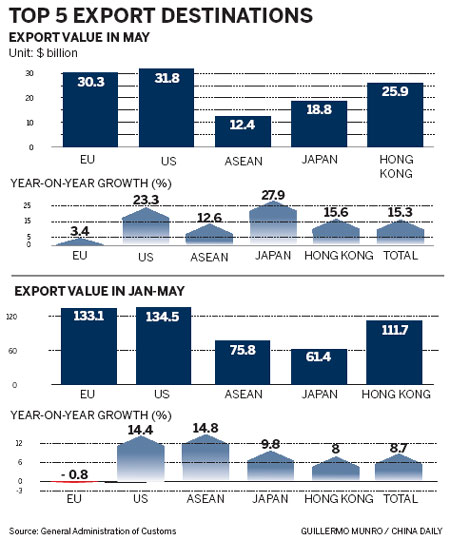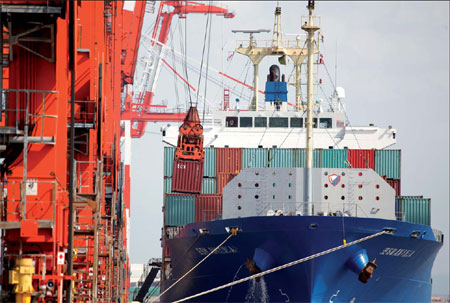One good figure does not a recovery make
Updated: 2012-06-15 12:43
By Yan Yiqi (China Daily)
|
|||||||||||
|
Experts remain cautious although Chinese exports to the European Union saw a rebound last month. Provided to China Daily |

A bright spot for China-EU trade in May has failed to quell pessimism
Economists are forecasting that trade between China and the European Union will remain sluggish in the next few months, even though last month's figures seemed to give cause for optimism.
Bilateral trade between China and the EU rose a little last month to $50.3 billion (38.4 billion euros), an increase of 4.8 percent on a year earlier. Exports to the EU rose 3.4 percent to $30.3 billion and imports rose 7 percent to $20 billion, according to figures issued by the General Administration of Customs.
"Figures in a single month cannot reflect the whole economic environment, because there are many seasonal factors," says Li Jian, a researcher with the Chinese Academy of International Trade and Economic Cooperation, which is affiliated to the Ministry of Commerce.
"The figures fluctuate from month to month but, generally speaking, there is no clear sign that would justify being optimistic."
In the first five months of this year, trade between China and the EU reached $220.8 billion, growing 1.3 percent year-on-year. Exports fell 0.8 percent from a year earlier to $133.1 billion and imports rose 4.6 percent to $87.7 billion.
"Given the weak export readings in the purchasing managers' index and the recent deterioration in economic data in Europe, we are far from confident that this improvement will prove durable," says Yao Wei, China economist with Societe Generale SA.
Eurozone finance ministers confirmed on June 9 that the single-currency area was ready to offer up to 100 billion euros in financial aid to rescue Spain's ailing banking sector.
Although EU's economic figures looked upbeat, with rising stock market indices and a stronger euro in response to the rescue plan, there is widespread concern that the stronger figures will prove fleeting, just as happened with Greece, Ireland and Portugal.
"The rescue plan for Spain is unlikely to be a turning point in the EU's recovery from the debt crisis," Li says, adding that full recovery is still a long way off.
Growth in China, the world's second-largest economy, slowed to 8.1 percent in the first quarter, the weakest in nearly three years.
The country's trade with Italy fell 19.4 percent year-on-year in the first five months of this year, and exports fell 25.1 percent. Exports to Germany fell by 3.4 percent to $27.9 billion, in the same period. "Trade in Italy and Spain deteriorated, especially that of Italy," says Xiong Hou, deputy chief of the department of economic studies of the Institute of European Studies under the Chinese Academy of Social Sciences.
"And figures between China and Germany, China's largest trade partner in the EU, were not as good as expected, which accounts for the continued sluggishness."
Because European countries have no further plans to expand financial and currency policies to avoid inflation, little can be expected for the rest of the year, Xiong says.
"But the good news is that in Europe things are unlikely to get worse."
While the economic environment outside China is keeping a dampener on Sino-EU trade, factors within the country are also having an impact.
"The trend of rising costs for Chinese labor and land are irreversible, so the country's products are losing their competitive edge on price," Li says.
Huang Buyan is the general manager of a wedding dress factory in Suzhou, Jiangsu province, that sells most of its products in European countries including Britain, France, Italy and Russia.
Huang says she has been forced to raise prices because of rent increases for her factory in Suzhou, one of China's most successful cities in terms of GDP, and because of the cost of skilled workers. As a result, Huang has lost some of her most regular customers this year.
"They were complaining a lot, even though I had brought down prices as much as I possibly could, and they turned to other suppliers. Compared with a couple of years ago, doing business overseas has become a lot more difficult."
The EU is China's largest trading partner, and Chinese experts and officials have all stressed the importance of keeping up trade growth between the two.
"Even though emerging markets such as Brazil and Russia are growing rapidly, that growth cannot make up for the losses China has incurred as a result of the European market's decline," Li says.
"After all, emerging markets account for less than one seventh of total trade."
On June 10, China urged Europe and the G20 summit, to be held in Mexico from June 18 to 19, to reach a "timely" and "decisive" consensus to prevent the European financial crisis from spreading.
yanyiqi@chinadaily.com.cn
(China Daily 06/15/2012 page20)
Today's Top News
Rescuers race against time for quake victims
Telecom workers restore links
Coal mine blast kills 18 in Jilin
Intl scholarship puts China on the map
More bird flu patients discharged
Gold loses sheen, but still a safe bet
US 'turns blind eye to human rights'
Telecom workers restore links
Hot Topics
Lunar probe , China growth forecasts, Emission rules get tougher, China seen through 'colored lens', International board,
Editor's Picks

|

|

|

|

|

|






